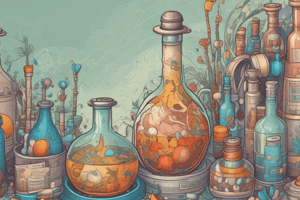Podcast
Questions and Answers
What is the primary focus of pharmacology?
What is the primary focus of pharmacology?
- The study of the chemical structure of drugs
- The study of the effects of drugs on living organisms (correct)
- The study of the therapeutic use of drugs
- The study of the effects of biological systems on drugs
Which branch of pharmacology examines the mechanisms of drug action?
Which branch of pharmacology examines the mechanisms of drug action?
- Pharmacodynamics (correct)
- Pharmacokinetics
- Toxicology
- Pharmacological Classification
What is the purpose of preclinical testing in drug development?
What is the purpose of preclinical testing in drug development?
- To classify drugs based on their chemical structure
- To evaluate the safety and efficacy of drugs in human subjects
- To evaluate the safety and efficacy of drugs in laboratory animals and in vitro systems (correct)
- To understand the therapeutic use of drugs
What is the term for the unintended effects of a drug?
What is the term for the unintended effects of a drug?
What is the term for the effects of one drug on the activity of another drug?
What is the term for the effects of one drug on the activity of another drug?
How do pharmacologists classify drugs based on their mechanism of action?
How do pharmacologists classify drugs based on their mechanism of action?
What is the importance of pharmacology in the development of new medicines?
What is the importance of pharmacology in the development of new medicines?
What is the importance of pharmacology in improving patient outcomes?
What is the importance of pharmacology in improving patient outcomes?
Flashcards are hidden until you start studying
Study Notes
Definition and Scope
- Pharmacology is the study of the effects of drugs on living organisms
- It involves the study of the interactions between drugs and biological systems
- Pharmacology is an interdisciplinary field that combines chemistry, biology, physiology, and medicine
Branches of Pharmacology
- Pharmacodynamics: The study of the effects of drugs on the body
- Involves understanding how drugs interact with their targets (receptors, enzymes, etc.)
- Examines the mechanisms of drug action
- Pharmacokinetics: The study of the movement of drugs within the body
- Involves understanding how the body absorbs, distributes, metabolizes, and eliminates drugs
- Examines the fate of drugs in the body
- Toxicology: The study of the adverse effects of drugs and other substances
- Examines the harmful effects of drugs and other substances on the body
- Involves understanding how to diagnose and treat poisoning and toxicity
Drug Development and Testing
- Preclinical testing: Testing of drugs in laboratory animals and in vitro systems
- Evaluates the safety and efficacy of drugs before human trials
- Clinical trials: Testing of drugs in human subjects
- Evaluates the safety and efficacy of drugs in humans
- Involves several phases, including Phase I (safety), Phase II (efficacy), and Phase III (large-scale efficacy)
Drug Interactions and Side Effects
- Drug interactions: The effects of one drug on the activity of another drug
- Can result in increased or decreased effects, or new effects
- Side effects: Unintended effects of a drug
- Can be mild or severe, and can affect any system of the body
Pharmacological Classification
- Chemical classification: Classification of drugs based on their chemical structure
- Therapeutic classification: Classification of drugs based on their therapeutic use
- Pharmacological classification: Classification of drugs based on their mechanism of action
Importance of Pharmacology
- Development of new medicines: Pharmacology plays a crucial role in the development of new medicines
- Improving patient outcomes: Pharmacology helps to improve patient outcomes by understanding how drugs work and how to use them effectively
- Understanding drug interactions and side effects: Pharmacology helps to understand and minimize drug interactions and side effects
Definition and Scope
- Pharmacology is the study of the effects of drugs on living organisms, involving the study of interactions between drugs and biological systems.
- It is an interdisciplinary field that combines chemistry, biology, physiology, and medicine.
Branches of Pharmacology
Pharmacodynamics
- Studies the effects of drugs on the body, understanding how drugs interact with their targets (receptors, enzymes, etc.).
- Examines the mechanisms of drug action.
Pharmacokinetics
- Studies the movement of drugs within the body, understanding how the body absorbs, distributes, metabolizes, and eliminates drugs.
- Examines the fate of drugs in the body.
Toxicology
- Studies the adverse effects of drugs and other substances, examining the harmful effects of drugs and other substances on the body.
- Involves understanding how to diagnose and treat poisoning and toxicity.
Drug Development and Testing
Preclinical Testing
- Testing of drugs in laboratory animals and in vitro systems, evaluating the safety and efficacy of drugs before human trials.
Clinical Trials
- Testing of drugs in human subjects, evaluating the safety and efficacy of drugs in humans.
- Involves several phases, including Phase I (safety), Phase II (efficacy), and Phase III (large-scale efficacy).
Drug Interactions and Side Effects
- Drug interactions are the effects of one drug on the activity of another drug, resulting in increased or decreased effects, or new effects.
- Side effects are unintended effects of a drug, which can be mild or severe and affect any system of the body.
Pharmacological Classification
- Chemical classification: classification of drugs based on their chemical structure.
- Therapeutic classification: classification of drugs based on their therapeutic use.
- Pharmacological classification: classification of drugs based on their mechanism of action.
Importance of Pharmacology
- Plays a crucial role in the development of new medicines.
- Helps to improve patient outcomes by understanding how drugs work and how to use them effectively.
- Helps to understand and minimize drug interactions and side effects.
Studying That Suits You
Use AI to generate personalized quizzes and flashcards to suit your learning preferences.




